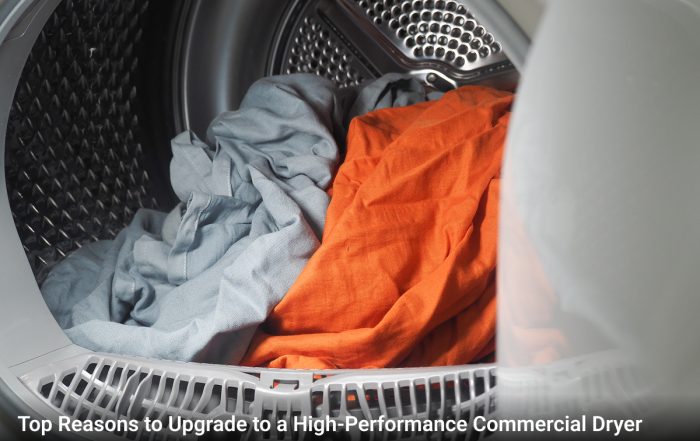
How Seasonal Changes Impact Your Commercial Laundry Equipment
Commercial laundry operations must perform reliably year-round, but Canada’s dramatic seasonal shifts—from dry, frigid winters to hot, humid summers—can place significant strain on both washers and dryers. These climate extremes don’t just affect customer demand; they also impact the functionality, lifespan, and maintenance needs of your machines. Understanding how seasonal changes impact commercial laundry equipment allows you to prepare, prevent downtime, and protect your investment.
At Coronet Equipment, we help laundry operators in Edmonton and surrounding areas adapt their systems to changing weather conditions. With proper preparation, you can keep your equipment running efficiently through every season.
Winter Woes: Cold Temperatures and Frozen Lines
When temperatures plummet, so do the risks to your plumbing and washer components. In uninsulated or poorly heated spaces, water lines and valves are susceptible to freezing, which can result in burst pipes or cracked fittings. Frozen drain lines and inlet valves can also prevent your washers from operating altogether, causing delays and potential damage to internal components.
To protect your commercial washers during Alberta’s harsh winters, ensure that all laundry spaces are adequately heated and ventilated. Keep exterior walls insulated, and check that water lines are secured away from drafty areas. Preventive maintenance should include inspecting seals and gaskets for cold-induced brittleness and checking that hoses and valves haven’t developed micro-fractures due to freeze-thaw cycles.
Dryers, too, can struggle in extreme cold, especially vent systems. If warm exhaust air meets cold outdoor temperatures in the ducting, condensation can form and freeze inside the vent, restricting airflow and increasing fire risk. Coronet recommends regular cleaning of lint traps and vent ducts to ensure safe and efficient drying throughout the winter months.
Summer Strain: Heat, Humidity, and Moisture Build-Up
Hot, humid summers can be just as challenging for commercial laundry systems. Excess moisture in the air reduces the efficiency of dryers by making it harder for water to evaporate from fabrics. This results in longer drying cycles and increased energy consumption, especially if your facility isn’t well-ventilated.
High humidity can also impact washers by accelerating mould and mildew growth, particularly around seals, gaskets, and detergent drawers. This not only leads to unpleasant odours but also hygiene issues in environments where cleanliness is non-negotiable, such as healthcare, hospitality, and athletic facilities.
Prevent these problems by improving airflow in your laundry room with dehumidifiers or HVAC upgrades. Regular cleaning and sanitizing of rubber seals and internal compartments also reduces the risk of microbial growth. During the summer, inspect your machines for signs of rust or corrosion, which can worsen with prolonged exposure to moisture-laden air.
Seasonal Demand Fluctuations and Operational Load
In addition to environmental factors, the seasons influence how often and how heavily your equipment is used. Summer often brings increased laundry volume in campgrounds, hotels, and sports facilities, while winter sees spikes in laundry demands from shelters, senior residences, and schools due to layered clothing and heavier linens.
With increased loads come more wear and tear on belts, motors, and valves. Washer extractors, in particular, face heavier stress during high-use months. Coronet Equipment’s service team can help prepare your facility for seasonal spikes by performing inspections, recommending part replacements, and ensuring your equipment is calibrated for optimal throughput.
Routine maintenance at the start of each season ensures your equipment is ready for whatever demand fluctuations lie ahead.
Energy Efficiency Throughout the Year
Adapting your laundry systems to seasonal shifts doesn’t just prevent damage—it can also save you money. For example, cold water detergents can help you maintain high wash quality without relying on hot water in the winter, reducing energy consumption. Similarly, using moisture-sensing dryers during humid summer months can prevent over-drying and protect your fabrics.
To stay ahead of utility costs, consider upgrading to ENERGY STAR® certified equipment. In Canada, the ENERGY STAR program is administered by Natural Resources Canada, and equipment that meets its standards is built to perform under a variety of conditions while using less water and energy. Seasonal efficiency translates to annual savings.
Preventive Maintenance Is Seasonal, Too
Seasonal maintenance should be as regular as cleaning lint traps or replacing detergent. Before the cold hits, inspect inlet and drain hoses, check door seals for flexibility, and ensure dryers are fully vented and free of obstructions. Heading into summer, prioritize cleaning ducts, inspecting fans, and recalibrating temperature sensors.
Coronet Equipment offers local service from factory-trained technicians who understand the unique demands of operating commercial laundry equipment in Alberta’s climate. From seasonal tune-ups to emergency repairs, our laundry equipment services and installation in Edmonton are designed to keep your machines operating smoothly through all seasons.
Recent Posts
When to Repair vs. Replace Your Commercial Washer
For businesses that depend on reliable laundry operations, from hotels and healthcare facilities to laundromats and multi-unit housing, deciding whether to repair or replace your commercial washer is a critical choice. The decision affects not [...]
Top Reasons to Upgrade to a High-Performance Commercial Dryer
For businesses that rely on laundry, whether laundromats, hospitality, healthcare facilities, multi-housing complexes, or on-premise laundry operations, choosing the right commercial laundry equipment is essential. While many companies focus on washers first, upgrading your commercial [...]
How to Know When Your Commercial Washer Needs New Parts
A dependable commercial washer is essential for any high-volume laundry operation. Over time, however, even the most durable machines experience wear on critical components. The good news is that washers usually show early warning signs [...]



